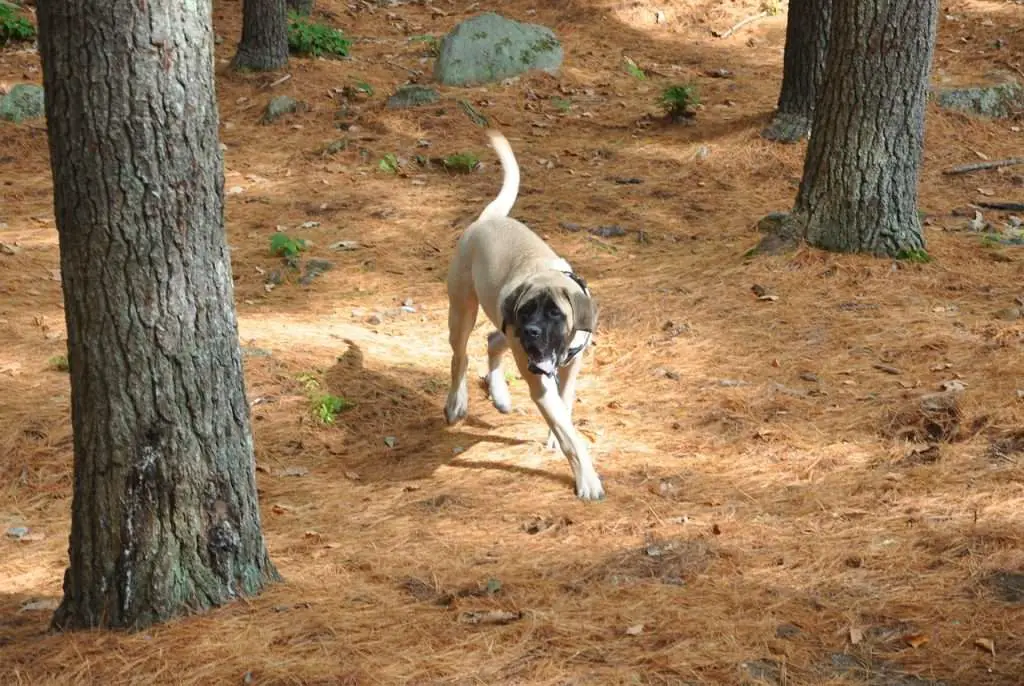English Mastiff Lifespan & Common Health Issues

Mastiffs are one of the largest dog breeds out there, and owning one isn’t something that should be taken lightly.
Before I dedicated myself to owning mastiffs, I made sure I exhaustively researched this affectionate breed to the max. I wanted to be sure I knew everything and what to expect before I made such a big commitment.
Owning Mastiffs is a blessing. A blessing in a very large, cuddly disguise. They’re loyal and loving and make great family dogs. The English Mastiff temperament simply can’t be compared to many other breeds.
The question is, how long can you expect to have this lovable giant living in your home?
During this article, I’ll be explaining, from personal experience, just how long the life expectancy of a mastiff is, but also guide you through some of the common health issues that may impact the English Mastiff lifespan.
Let’s find out more.
What is the English Mastiff’s Lifespan?
The English Mastiff Lifespan ranges from anywhere between 6-10 years.
But can English Mastiffs live longer than this rather short life expectancy?
The short range of life expectancy in an English Mastiff can vary a lot depending on factors such as physical health, diet, family history, and even your day to day maintenance.
Unfortunately, their size can also play a part in how long they will live, this is a common correlation in the dog world. It’s likely that the larger an English Mastiff is, the shorter its life expectancy. You can get a good grasp on how big your English Mastiff might grow, right here.
Physical Health Issues
English Mastiffs are prone to many health conditions that can contribute to their short life expectancy; I will go into more detail about possible health disorders shortly.
Nutrition and Diet
As with any breed, what they’re fed on a daily basis can play a part in their life expectancy. English Mastiffs require quite a high-quality food and a diet which is rich in protein and antioxidants. This kind of food can reduce the ageing process, lengthening the dog’s lifespan. Do your research when looking into nutrition for your English Mastiff, and be sure it contains nutrients such as omega-three fatty acids, high protein availability, minerals, and vitamins A, C, and E.
Family History
When adopting or purchasing an English Mastiff, it’s always essential to check with the breeder about the dog’s family history where possible. Of course, I realise this isn’t always possible, especially when rescuing or adopting.
The family history of an English Mastiff can give a good indication of how long your dog might live.
For example, if the dog’s parents died relatively young, or even their grandparents, this is a sign that the dog might have a shorter lifespan and may be susceptible to certain health conditions associated with the breed.
If you can, taking part in DNA testing may be able to distinguish whether or not your Mastiff has any ancestral genetic disorders.
On the subject of breeders, If you’re based in the UK and looking to own an English Mastiff, then why not check out our list of the top UK Mastiff breeders.
Maintenance and General Health Care
Because of the size of an English Mastiff, they require specific care and have unique needs that other, smaller breeds don’t necessarily possess. This is mainly focused on exercise that affects their bone health and joints.
While these enormous hounds require daily exercise, they should be limited to around 30 minutes to one hour per day and should certainly not exceed two hours daily.

When your English Mastiff is a pup, you start by introducing them to short spurts of walking, 5, maybe 10 minutes at a time. Increase this by another 10 minutes per week as they grow up.
Also, try introducing your young pup to water from an early age. Swimming provides great joint exercise and doesn’t put too much pressure on the bones.
Additionally, you should do what you can to ensure your Mastiff has enough room to relax in a comfortable environment. The large, sensitive souls require space to relax, but beyond that, investing in a large, robust crate and comfortable bed for your Mastiff can help them find a sense of sanctuary which can reduce issues such as anxiety and overheating which can have knock-on effects.
Why Does The English Mastiff Have A Short Lifespan?
As we’ve already touched upon, there are several factors that can mean an English Mastiff has a shorter lifespan than that of other breeds.
Some of the reasons for this are down to common health problems that can arise with the breed. These are:
1
Arthritis
As I’ve briefly covered, one focal point of English Mastiff care is ensuring you look after their bone and joint health. This is once again down to the size of the breed. Arthritis often occurs in old age, but depending on genetics and exercise, it can become a problem early on.
2
Hypothyroidism
Hypothyroidism is often seen in English Mastiffs and occurs when the thyroid gland stops generating enough hormones. Some symptoms of hyperthyroidism include weight gain, lethargy and hair loss. You should get their thyroid function tested regularly as the Mastiffs tendency to laze around, paired with limited exercise may be hard to distinguish from actual hypothyroidism symptoms.
3
Bloat/Twisted Stomach
Bloat is a common problem in many large, broad chested dog breeds, including English Mastiffs. It usually happens after or during eating. Air and fluid gets trapped in the stomach, which may eventually cause it to twist (gastric torsion). This can be a fatal condition and requires urgent veterinary attention. Signs your dog is experiencing bloat include hyper-drooling, stress, agitation, and visible pain.
4
Wobbler Syndrome
Wobbler Syndrome is a condition which affects the nervous system and vertebrae (spinal cord). It occurs when the spine is compressed, which can sometimes lead to paralysis. This condition can cause the dog an immense amount of pain.
5
Heart Problems
Because Mastiffs are such a large breed, they also have a larger heart than others. This means it works much harder, which can lead to heart disease and even cardiac arrest. Symptoms to look out for are collapsing and difficulty breathing.
DCM, or Dilated Cardiomyopathy, is another common heart problem seen in English Mastiffs. The disease causes an enlarged heart and, eventually, heart failure.
6
Hip & Elbow Dysplasia
Once again, because of their immense size, dysplasia can occur in English Mastiffs and is quite common, specifically in their hips and elbows. The condition occurs when the cells grow to an abnormal size, causing the joints to move out of place or become misaligned. Regular vet checks can help combat or prolong the effects of dysplasia and spot them in the early stages.
Questions To Ask Your Breeder
Below are some things that you should be checking with your breeder and questions you can ask concerning your dog’s genetic health:
Q. How old is the sire?
A. Mastiffs should be bred between the age of 22 months and 7 years)
Q. How many litters has the mother had? And when was her last litter
A. Litters should be no less than 12 months apart
Q. How old was she when she had her first litter?
A. No older than 22 months
Q. How was the stud selected?
A. Look for answers regarding health, personality traits and genetics
Q. Are both parents cleared of any genetic conditions?
A. Ask to see records of all tests, checks and X-Rays
Q. What breeding club are the parents registered with?
A. They should be registered with MCOA or another regional Mastiff club
Q. Ask to see the living environment of the parents and puppies
A. It should be spacious, clean, with access to fresh water and regular outdoor activity or exercise facilities.
I have compiled a list of the best English Mastiff breeders in 2023 who are certified, and able answer any question a potential owner has.
Tips That Can Help Your Mastiff Live Longer
When adopting or purchasing any new dog, there are a few obvious things you should already have in place and be prepared for to best care for your English Mastiff, such as:
- Register with a reputable vet
- Find out as much as you can about the dogs family history
- Get puppy checks done
- Stick to regular vet checks
- Keep up to date with injections
- Have your dog neutered
- Secure an insurance policy
- Research the breed to ensure proper care management
But what else can you do to properly maintain the health and well-being of your English Mastiff and possibly extend the longevity of their lives?
Let’s find out.
Diet and Nutrition
As we looked at earlier, English Mastiffs require a good-quality, high-protein diet rich in vitamins, minerals, and essential fatty acids.
The dog food market is pretty saturated, so speak to your vet about the best quality food available when you get your puppy. Always stick to the recommended feeding quantities. Overfeeding can lead to weight gain, resulting in a shorter life expectancy.
Smaller meals, more frequently are also sometimes advised as a method to help avoid bloat.
Socialisation
You wouldn’t think socialising your English Mastiff would affect how long they live, would you? However, studies show that the more a dog is socialised, the less stressed it will likely be.
Taking your dog to puppy classes, and having them constantly interact with other people, such as family, friends and neighbours, can mean they’re less anxious and nervous. A stressed dog can mean an unhappy, aggressive or unhealthy dog. Makes sense.
Exercise
It goes without saying that an imbalance of exercise (too little or far too much) is detrimental to life expectancy; that same rule applies to us two-legged folks as well, right?
Without overdoing it regarding their bone health (which we’ve already looked at), providing your English Mastiff with the correct amount of exercise daily can significantly increase their life expectancy.
Try to get them involved in swimming from an early age; an excellent workout for larger dogs who are prone to bone disorders. You can also take part in light exercise around the garden such as tug-of-war or sniff puzzles.
General Health Care
Lastly, the most important thing you can do for an English Mastiff is to keep up with the necessary health care requirements. Things like regular vet checks, staying on top of injections, fleas, worming’s, and dental examinations. Vets can spot the early signs of common problems in Mastiffs, such as skin infections, cherry eyes, and cysts.
Check out my guide on grooming your English Mastiff to correctly maintain good skin and coat condition.
Final Thoughts on English Mastiff Lifespan
So, if you are considering bringing an English Mastiff into your home, whether as a puppy or rescued from the dog’s home, there are some key things to ensure your dog has a long and happy life.
Keeping a record of their health and family heritage, as well as regular veterinary checks to keep on top of common English Mastiff conditions such as heart disease, arthritis, dysplasia, and DCM, is vital to improving the longevity of your dog’s life.

Although English Mastiffs have a much shorter life expectancy than other breeds, just 6-10 years, there are plenty of things you can do to possibly extend this. Did you know the record holder Zorba lived until he was 13 years old, and he was a giant!
With the proper care, maintenance, and health checks, as well as socialising and a good-quality diet, it is possible for your English Mastiff to live a longer life, with a great health span and increased mobility in its senior years.
Owning any dog can be concerning for owners who are apprehensive about the longevity of their life. For anyone who knows the love and joy the English Mastiff can bring to their owners, it can be a heartbreaking aspect to think they won’t be with you for as long as you’d like.
However, the years you get with your beloved Mastiff will, without a doubt, be the best of yours and their lives. They love unconditionally and are exceptionally loyal to their families. So, as long as you provide them with the best care and love them until no end, you can rest assured that no matter how long your dog is with you, owning a Mastiff will be one of the best decisions you’ve ever made.